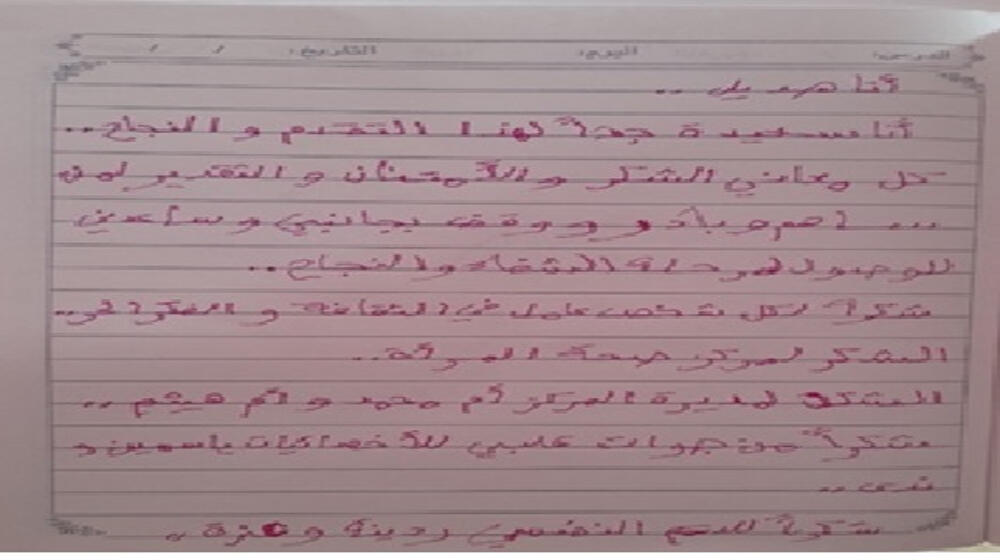Hadeel, a 34-year-old woman, has endured significant psychological trauma since her high school years. It all began when she witnessed a girl falling from the top of her school after having a conversation with her prior to the incident. Witnessing the girl's life dissipate before her eyes had a profound impact on Hadeel's mental well-being, causing a steady decline in her psychological state. Eventually, Hadeel received a diagnosis of Hereditary Disease, which resulted in generalized muscle weakness throughout her body and excessive weight gain due to her inability to move for over five years, confining her to her bed. Consequently, Hadeel became entirely dependent on her family for every aspect of her daily life. Even while sleeping, she sits upright, fearful that her head would slip out of her grasp, symbolizing a loss of control over her own life. Seeking rehabilitation, Hadeel was admitted to Al-Wafa Hospital, but unfortunately, her condition showed no signs of improvement, leaving her in doubt and confusion.
Recognizing Hadeel's desperate situation, a social worker from the Bureij Women's Health Center and safe space referred her for evaluation. During the assessment, Hadeel's eyes showed a lack of trust, and she interacted with minimal responsiveness to the team's efforts. After establishing an agreement with Hadeel's mother, a home visit was scheduled. Hadeel began receiving comprehensive treatment sessions that encompassed occupational therapy, physiotherapy, and psychological therapy. It was agreed upon that a family member would be present during each session, ensuring that Hadeel could practice the techniques throughout the week, as a single session was deemed insufficient. With the parents' cooperation, Hadeel attended every session, exhibiting increased responsiveness. She eagerly awaited the visits and committed herself to active participation. Consequently, the frequency of the visits was increased to twice a week, lasting two hours each. Gradually, the sessions transitioned from being dependent on specialists to Hadeel taking the lead, with specialists providing support as needed. From the project's onset, Hadeel was informed that it would conclude at the end of the year, fostering confidence and trust in her ability to continue the exercises independently on a daily basis.
The physiotherapy sessions primarily focused on strengthening Hadeel's limb muscles, correcting her posture, and enhancing control over head movements in conjunction with the torso. Occupational therapy activities involved utilizing various tools such as balls, hand nets, crystals, clay, and a limb bicycle to enhance upper limb functionality. Through consistent effort, Hadeel achieved a significant milestone: she regained the ability to eat by herself, initially requiring an hour and fifteen minutes but eventually reducing the time to ten to fifteen minutes with daily practice. Moreover, Hadeel regained the ability to write and, finally, experienced normal sleeping patterns by lying on her back and sides.
Previously, she had relied on assistance to change her body positions, but with the aid of exercises and the psychologist's guidance, this task became easier. Gradually, Hadeel progressed from sleeping with two pillows to just one, no longer losing consciousness when resting her head. Another significant challenge for Hadeel was leaving her room, as she harbored a great fear that venturing outside might result in harm. Initially, an X-ray of Hadeel's leg was requested at the start of the intervention, but her weight, limited mobility, and fear made it difficult for her to leave the house. However, with the psychologist's assistance and proper preparation, Hadeel successfully conquered her fears and made the pivotal journey to the hospital for the X-ray, marking a remarkable achievement in her progress. The therapists employed ropes and supportive devices to correct and strengthen her limb positions, facilitating coordinated movements. Additionally, Hadeel received a weight-loss diet to enhance her health and body status.
Recently, Hadeel actively participated in the olive season, adeptly placing olives into bottles. She can now eat independently, sleep comfortably on her back, and exercise control over her trunk and head movements. Hadeel has regained the ability to leave her room, visiting the hospital and joining her family for outings and other activities. These achievements have not only impacted Hadeel's physical capabilities but also her acceptance within the community. Previously rejected, she now enjoys the embrace of her community, signifying a remarkable transformation.
In a moving spot on her progress, Hadeel, who was once unable to hold a pen, expressed her immense gratitude and appreciation for the support she has received, personally writing a letter as shown in this photo.


